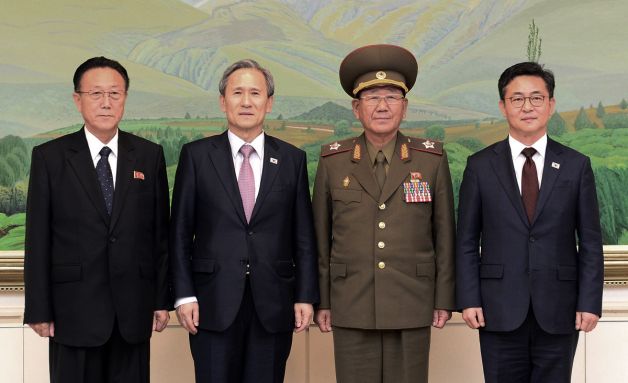- California Assembly OKs highest minimum wage in nation
- S. Korea unveils first graphic cigarette warnings
- US joins with South Korea, Japan in bid to deter North Korea
- LPGA golfer Chun In-gee finally back in action
- S. Korea won’t be top seed in final World Cup qualification round
- US men’s soccer misses 2nd straight Olympics
- US back on track in qualifying with 4-0 win over Guatemala
- High-intensity workout injuries spawn cottage industry
- CDC expands range of Zika mosquitoes into parts of Northeast
- Who knew? ‘The Walking Dead’ is helping families connect
N. Korean official says S. Korea ‘must have learned serious lesson’

In this photo provided by the South Korean Unification Ministry, South Korean Unification Minister Hong Yong-pyo, right, and presidential security adviser Kim Kwan-jin, second from left, pose with Kim Yang-gon, right, a senior North Korean official responsible for South Korean affairs, and Hwang Pyong-so, North Korea’ top political officer for the Korean People’s Army, after their meeting at the border village of Panmunjom in Paju, South Korea, Tuesday, Aug. 25, 2015.(The South Korean Unification Ministry via AP)
By Brian Han
Following the concluded inter-Korean negotiations on Tuesday, a top North Korean official stated that the South would be better off learning a lesson to not fabricate provocations from the North.
Director of the General Political Bureau, Hwang Pyong-so, was referring to the landmine attack, which acted as a catalyst to the rapidly rising tensions experienced on the peninsula.
He was the chief representative for the North during the talks.
This statement was made directly after the communist nation agreed to express regret for those same attacks.
“Through North-South emergency high-level contact this time, the South must have learned a serious lesson that it will bring an armed clash if it creates a groundless case and provoke the other side,” Hwang said on domestic news station Korean Central Television.
He followed up by expressing his relief that the situation had been diffused and his hopes to improve bilateral ties.












![일본 사도광산 [서경덕 교수 제공. 재판매 및 DB 금지]](http://www.koreatimesus.com/wp-content/uploads/2024/07/PYH2024072610800050400_P4-copy-120x134.jpg)


